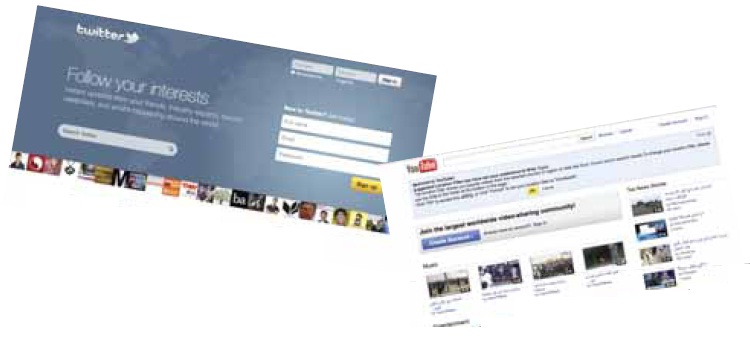
In the wake of the revolution, users of social networking sites provide a platform for political and community awareness
In 1999, Egypt had 30,000 Internet subscribers. By 2010, this number had increased to 23 million. After the January 25th revolution, Internet subscriptions surged by 3 million users, and the number of Facebook users in Egypt increased by 1 million, according to Nahed Azab, assistant professor of management information systems and author of "The Role of the Internet in Shaping the Political Process in Egypt," which will be published in the March 2012 issue of The International Journal of ePolitics.
Not only have online users increased significantly, the Internet map in Egypt is bound to change in the near future. "We'll be seeing more women, the elderly and low-income individuals on Facebook," said Azab. "People with the misconstrued perception that social media tools can only serve entertainment purposes will realize otherwise. We will see more users on Facebook to market, promote, advertise and conduct business."
The existence of, and easy access to, the Internet and social media tools have played an important role in mobilizing thousands of Egyptians, unified not by religion, ideology or social standing, but by one common attribute –– the need to bring about change.
For Azab, the increased online presence was predictable. "What
really marked the onset of change was the creation of the April 6
Movement Facebook page in 2008," she explained. "At the time, there
were only 800,000 Facebook users in Egypt. Within the first week of
creating the page, 70,000 members subscribed to it.
This was a clear signal that political change
was on the way."
Undoubtedly, Web 2.0 applications have acted as power platforms for the revolution, but skepticism remains about whether the increased online presence in Egypt may have an adverse effect on the accomplishments of the uprising. "This is highly unlikely," argued Naila Hamdy, assistant professor of journalism and mass communication. "I don't believe that social media has the capacity to increase sectarian strife.
Problems have existed in society for many years and were not created by Web interaction. In fact, social media tools allow people to argue against extreme stances and express different opinions. After 30 years of singleparty rule, it was inevitable that many new voices would arise. Through social media tools, you are able to read about and discuss various and alternate views. You learn to respect others and realize that there are many great intellectuals in this country."
| |
However, Hamdy believes that social media will no longer be used to mobilize people. "Egypt's activists have already moved to other platforms, and Twitter will be more commonly used for citizen journalism in the future," she said. "The use ofYouTube will continue to increase, as this is more of a broadcast station."
The Internet's accomplishments do not end with the revolution. In fact, Egypt seems to be witnessing more e-prospects than ever. "The number of Google searches on Egypt now amount to more than 37 million each month; there are great e-commerce prospects here," noted Azab. "Before the revolution, only 0.4 percent of all Internet users in Egypt engaged in e-business practices, compared to 70 percent of total users in the United States. To get to where they are, we need to remedy issues related to cash reliance and identity protection legislation. Most entrepreneurs don't even realize the potential value in online advertising."
| |
There has been plenty of debate on exactly what role the Internet has played in the uprising, either as an initiator, facilitator, catalyst or driving force. "If the Internet was not important, then why did we witness this telecommunications blackout?" questioned Azab. "The Internet spreads news fast to a very wide audience, but the revolution succeeded because of all other factors that summed up to it: corruption, unemployment and poverty. Surely, social media facilitated this, but it was also all other driving factors, including recent events in Tunisia."
Now, it is up to Egyptians to finish what has been started. "The groundwork has already been laid by the former government," noted Hamdy. "Despite the shortcomings of the former regime, we must not undermine some of the more positive initiatives, such as the creation of the Ministry of Communication and Information Technology and its attempts at bringing Egypt into this digital era. There is already an e-government project that needs to be further developed. There are also several educational projects that are meant to bring the Internet with all its applications to every child and family in Egypt, and plans are underway for extending Wi-Fi coverage into more towns and cities."
With prospects for political, social and economic change blooming, the road ahead seems promising. "This past February, we achieved an important landmark," said Hamdy. "I believe that with our newly acquired freedom, through traditional media or Web tools, we will be able to further our objectives as a nation."

By Ghaydaa Fahim